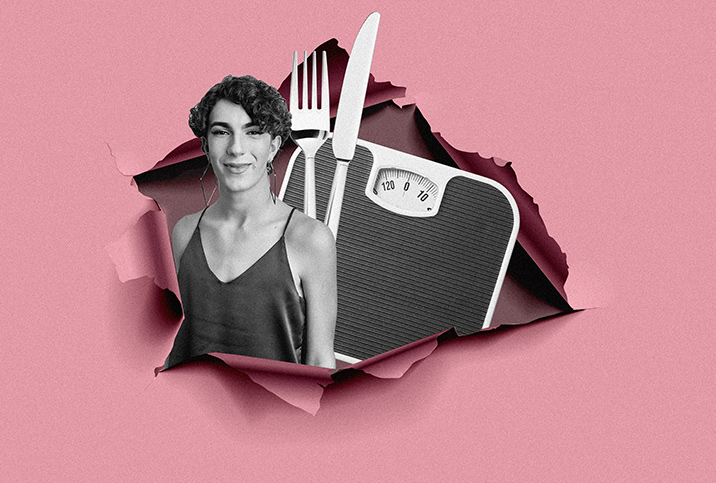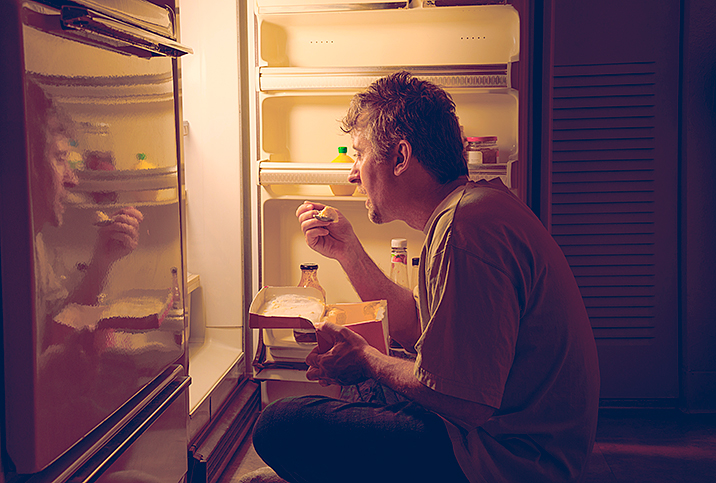It's Not Easy to Care for Loved Ones With Eating Disorders

Someone with a diagnosed eating disorder has exhibited notable impairments in their behaviors, cognition and feeding patterns. As a result, body weight and/or size has an excessive influence on feelings of self-worth and esteem.
This behavior usually comes at the expense of physical well-being and interpersonal functionality. For instance, the disruption of hormones from nutritional deficiencies can lead to sexual dysfunction and reproductive challenges, putting extra stress on romantic relationships and potentially causing separation.
Whether it's the effects of starvation from anorexia nervosa, compensatory purging behaviors from bulimia nervosa or overeating from binge eating disorder (BED), each type of eating disorder comes with its own considerations and potentially deadly medical repercussions.
In order to live fulfilling lives with a prosperous career and healthy, long-term relationships, people with an eating disorder must deal with it indefinitely. Support from partners and loved ones makes all the difference because eating disorders are regarded as family diseases.
The impact of eating disorders is universal, so knowing how to properly care for loved ones with a disorder—which may include yourself—is critical for everyone in the patient's circle of support.
Living with eating disorders
There is no be-all and end-all cure for eating disorders. Anorexia nervosa, bulimia nervosa and binge eating disorder are chronic illnesses that require continued care. Being upfront about eating disorders is crucial.
"Honesty is always the best policy; honesty about having an eating disorder and being in treatment, honesty about what support looks like and what you need, and honesty about your boundaries and what is not helpful," said Elizabeth Wassenaar, M.D., M.S., the regional medical director of the Eating Recovery Center in Denver.
In order to achieve rehabilitation, patients must give up rigid relationships with food and give themselves more flexibility, according to Molly Perlman, M.D., MPH, CEDS, chief medical officer of Monte Nido & Affiliates in Miami and a member of the board of directors of the Eating Disorders Coalition.
For lasting recovery, patients need to find positive ways to manage stress rather than turning to an eating disorder, Perlman said. It's not a simple process, and these misconceptions are extremely harmful.
There are fallacies in medicine and society at large that equate thinness to being healthy and obesity to being unhealthy, said Johnny Williamson, M.D., a Chicago-area psychiatrist who practices virtually with the eating disorder treatment program Alsana.
"There are some principles that underlie it that are real, but we take those kinds of concepts and just caricaturize them," Williamson said. "Someone might be in a small body for unhealthy reasons, and inherently being in what's considered a larger body doesn't qualify you for health concerns."
Thinness is currently idealized in many societies, which is a contributing factor to eating disorder prevalence because of feelings of pressure about how to look. Dismantling these ideas can be a key feature of public awareness about eating disorders and help provide a clearer perspective for patients, promote healthy relationships with their bodies and increase feelings of support.
It could change the way people look at eating disorders and make millions of lives easier.
Dating with eating disorders and talking to your partner
There is no area of life that eating disorders can't impact. In particular, romantic relationships suffer because the disorder has a knack for distorting the mind. So much so, in fact, that a supportive comment could be misinterpreted by the sufferer and actually become unhelpful.
For example, saying "You look better/healthy" to someone in treatment or recently out of it could instead be heard as "You look fat/bigger." This could cause a breakdown on one side and confusion and hurt on the other.
Perlman stressed how necessary family therapy is to aid with accurate and healthy communication. All of the healthcare professionals interviewed for this report emphasized the significance of disclosure from patients about their history, current condition and course of treatment. Only then can their partners better empathize and encourage continued recovery.
Another impediment is a preoccupation with food and eating. Disordered thoughts can become so consuming that personal relationships are no longer a priority; nothing comes before the eating disorder. Patients may fail to engage with their partners because eating disorders are so time-consuming, and if they feel threatened, they may become distanced, secretive and even hostile.
This behavior can be detrimental to a relationship and may even lead to a breakup.
"Being sensitive that your partner may need their own support is not a bad thing," Wassenaar said. "We often encourage partners or parents to seek their own psychotherapy or support as they work to support their loved one in treatment so that they can show up well and work on their own mental health through the process."
Becoming comfortable with physical intimacy can be a high hurdle for people with eating disorders. Negative self-image may make them feel embarrassed by their bodies. Consequently, these thoughts diminish the desire to connect. Though there is limited research in this sector for BED, Williamson said he sees these effects often in his practice.
Some physiological or hormonal problems may originate from eating disorder symptoms that inherently cause sexual dysfunction. Such effects tend to be seen more with anorexia than bulimia. All of these factors contribute to an unhealthy sex life.
Prevention and aftercare
As is true with other disorders, it's always best to prevent eating disorders before they become a significant problem.
"Even if we can't get there before it happens, the earlier in the course of this, the better," Williamson said.
He and Perlman stressed the importance of training and education for practitioners and other professionals to identify and circumvent the development of eating disorders. This approach benefits all parties, from individuals who avoid suffering to insurance companies that save money on costly treatment.
Technology and various forms of media have an outsized influence on eating disorders, particularly for minors, Williamson and Perlman said. Younger groups could be exposed to triggering content without the knowledge of their caregivers. And don't think adults are immune to this effect. Clearing social media of sensitive stimuli and establishing a positive environment are advisable actions to ward off eating disorder development.
Even when someone does develop an eating disorder and gets treatment, the battle is not over at the completion of treatment. Eating disorders are chronic, and diligent adherence to ongoing treatment plans is vital, including meeting nutritional goals and following meal plans.
Regular consultation with a treatment team, including dietitians, therapists, support groups and loved ones, can help keep recovery on track.
Self-awareness allows the patient to recognize when they are at risk for relapse.
Supporting someone with an eating disorder
Watching a loved one struggle with this life-threatening illness is difficult. Many people feel powerless to help and may even blame themselves for the condition, but that couldn't be further from the truth. Eating disorders are no one's fault, but everyone can help, and they need an equally group-based solution.
A sturdy support system can make all the difference, no matter a patient's stage. Educate yourself on the do's and don'ts to avoid unintentionally triggering them. As highlighted above, sometimes even the best of intentions can be misconstrued.
If there are any warning signs, seek advice from a professional or another trusted source. Make sure the person knows they have both encouragement and someone to fall back on, but don't take the offensive unless there is an immediate medical emergency.
You may be met with belligerence, especially when the person first enters treatment, but it can recede with time. When you have both reached a stage where everyone is actively working toward stabilization, you have a good opportunity to keep an eating disorder at bay.
Resources for patients and caregivers
Living life with an eating disorder is tumultuous for patients and their loved ones. The road to recovery is full of ups and downs, and having a supportive treatment team is paramount. To learn more, check out these resources that the healthcare professionals recommended:
- The National Eating Disorders Association (NEDA), National Alliance for Eating Disorders (NAED) and National Association of Anorexia Nervosa and Associated Disorders (ANAD) are go-to sites for information on screenings, treatment, support and more.
- Project HEAL and a database through NAED are geared toward navigating the world of treatment, such as finding practitioners and handling insurance information.
- The Eating Disorders Coalition (EDC) is a resource of the government that has a wealth of research and policies about eating disorders and how to advocate for them.
- The Eating Recovery Center, Center for Discovery and The Renfrew Center are accredited, nationwide treatment centers providing various levels of care, comprehensive information and additional eating disorder resources.


















